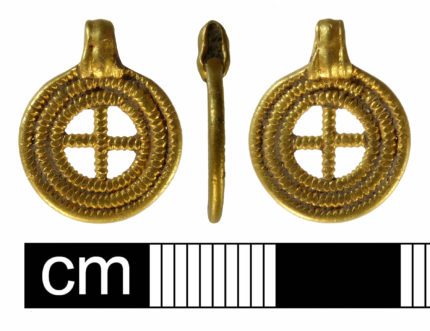An Anglo-Saxon gold pendant discovered in 2017 has been officially declared Treasure by the Norfolk Coroner’s Office according to the provisions of the Treasure Act 1996. It was found in an undisclosed location in South Norfolk near the site where another important piece from around the same period, the Winfarthing Pendant, was unearthed in 2014.
The pendant is in excellent condition. It is a small piece, .67 inches by half an inch, of a type known as a cross-in-ring pendant, a style that dates to the late 6th, mid-7th centuries. The ring part is composed of three concentric rings of gold beaded wire. In the center is a beaded wire cross. The outer rim is worn smooth, either from use or in the original crafting of the piece. A small sheet of gold is looped at the top middle. Traces of now-worn ribbed decoration remain.
Ms Shoemark, from Norfolk County Council’s archaeology department, said: “Like the Winfarthing assemblage, this piece most likely belonged to a high-status lady.
“It dates to an important turning point in Saxon history during the first flowering of Christianity [in England] and is of similar date to the jewellery assemblage from the now famous and nearby Winfarthing burial.
“Male graves of this period appear to be entirely lacking in elaborate jewellery.
“This latest pendant makes a valuable contribution to our understanding of Saxon society, religion and the position of women during a period of immense social and cultural change.”

The pendant will now be assessed by a valuation committee. Once its value has been determined, it will be offered to a local museum and the sum split between the finder and landowner. The Winfarthing Pendant was valued at £145,000, but it is much larger and inlaid with garnets reminiscent of some of the pieces in the Staffordshire Hoard.
Ðǽr wæs in ðam eorþ fela ǽrgestreóna. Cnihtas cúþ gedydon ðæt hie him ðæt gold to gode noldon habban.
:no:
“the first flowering of Christianity [in England]” – if you don’t count Britannia as England. But then Norfolk wasn’t yet England either.